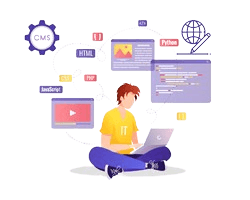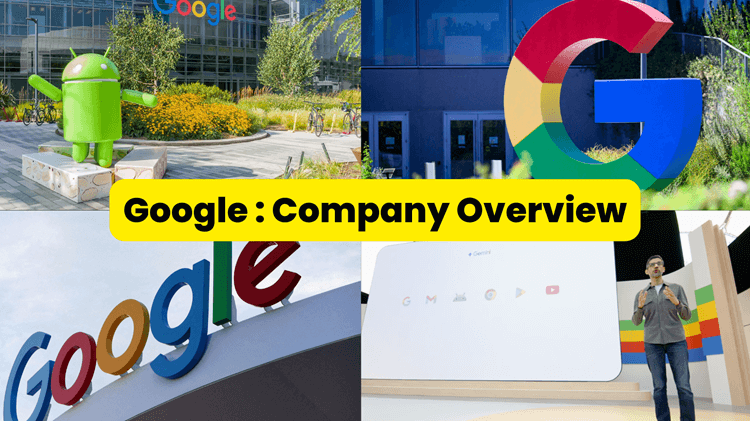Google: From Garage Project to Global Tech Giant
The Birth of a Tech Revolution
Google's story begins in 1996 when two Stanford University PhD students, Larry Page and Sergey Brin, began collaborating on a search engine initially called "BackRub." Their innovation was PageRank, an algorithm that ranked web pages based on the number and quality of links pointing to them -a revolutionary approach that delivered more relevant search results than existing search engines.
In 1998, the pair officially incorporated Google Inc. after securing $100,000 in initial funding from Sun Microsystems co-founder Andy Bechtolsheim. The name "Google" was a play on the mathematical term "googol" (1 followed by 100 zeros), reflecting their mission to organize the vast amount of information on the web.
Rise to Dominance
Google's clean interface and superior search results quickly attracted users. By 2000, Google was handling over 100 million search queries daily. The company introduced its now-famous text-based advertising model, AdWords (now Google Ads), creating a sustainable revenue stream that would fuel its growth for decades.
The early 2000s saw rapid expansion with the introduction of Google News, Gmail, Google Maps, and the acquisition of YouTube in 2006 for $1.65 billion. In 2004, Google went public with an IPO that valued the company at $23 billion—a figure that would grow exponentially in the coming years.
Google at a Glance: Key Metrics
| Category | Details |
|---|---|
| Revenue | $307.4 billion (2023) |
| Employees | Approximately 182,000 worldwide (2023) |
| Market Cap | $1.7 trillion (as of October 2024) |
| Headquarters | Mountain View, California, USA |
| CEO | Sundar Pichai |
| Parent Company | Alphabet Inc. |
| Founded | September 4, 1998 |
| Primary Products | Google Search, Android, YouTube, Google Cloud, Chrome, Google Workspace |
Top Job Profiles and Average Salaries
| Position | Average Base Salary (USD) | Total Compensation Range (USD) |
|---|---|---|
| Software Engineer | $140,000 - $170,000 | $180,000 - $400,000+ |
| Product Manager | $145,000 - $175,000 | $190,000 - $450,000+ |
| Research Scientist | $150,000 - $200,000 | $200,000 - $500,000+ |
| UX Designer | $130,000 - $160,000 | $160,000 - $300,000+ |
| Technical Program Manager | $145,000 - $175,000 | $185,000 - $350,000+ |
| Marketing Manager | $120,000 - $150,000 | $150,000 - $250,000+ |
| Data Scientist | $140,000 - $180,000 | $180,000 - $350,000+ |
| Cloud Solutions Architect | $155,000 - $185,000 | $200,000 - $400,000+ |
Note: Compensation packages typically include base salary, bonuses, and stock grants. Figures vary based on experience, location, and specific role.
Alphabet and Restructuring
In 2015, Google underwent a major corporate restructuring, creating Alphabet Inc. as a parent company. Google became Alphabet's largest subsidiary, while other ventures like Waymo (self-driving cars) and Verily (life sciences) operated as separate entities under the Alphabet umbrella. This allowed the core Google business to focus on its primary products while more experimental ventures could develop independently.
Google Today: A Tech Powerhouse
Today, Google dominates numerous tech sectors beyond search. Android powers billions of mobile devices worldwide, Google Cloud competes with AWS and Microsoft Azure in the cloud computing market, and Chrome is the world's most popular web browser.
The company continues to innovate in artificial intelligence, with breakthroughs like the language model LaMDA and the AI chatbot Bard (now Gemini). Google's AI research division, Google DeepMind, has produced innovations like AlphaFold, which revolutionized protein structure prediction.
Global Presence
Google maintains offices in over 60 countries across the globe. Its most significant locations include:
- Mountain View, California (Headquarters "Googleplex")
- New York City
- India
- London
- Zurich
- Singapore
- Tokyo
- Hyderabad
- Dublin (European Headquarters)
Each campus reflects Google's innovative culture with unique architecture, employee-friendly amenities, and sustainability features. Google's data centers operate across North America, South America, Europe, and Asia, powering its services worldwide.
Future Directions
AI and Machine Learning
Google is heavily investing in artificial intelligence and machine learning. The company's Gemini AI model represents its most advanced effort to compete in the generative AI space. Google is integrating AI across its product lineup, from Search and Workspace to Android and Google Cloud.
Quantum Computing
Through its Quantum AI team, Google is pursuing quantum computing research. In 2019, the company claimed to achieve "quantum supremacy" with its 53-qubit Sycamore processor performing a specific task faster than the world's most powerful supercomputers.
Sustainability Initiatives
Google aims to operate on 24/7 carbon-free energy across all its data centers and campuses by 2030. The company has already made significant investments in renewable energy projects worldwide.
Health Technology
Through initiatives like Google Health and partnerships with healthcare organizations, Google is expanding its presence in the healthcare sector, focusing on using AI to improve medical diagnostics and patient outcomes.
Challenges and Controversies
Despite its success, Google faces significant challenges:
- Antitrust Scrutiny: Regulators in the US, EU, and elsewhere have investigated Google for potential anticompetitive practices.
- Privacy Concerns: The company's data collection practices have drawn criticism from privacy advocates.
- Content Moderation: Google-owned YouTube continues to struggle with misinformation and harmful content.
- Employee Activism: Google has experienced internal protests over government contracts, workplace harassment, and other issues.
Impact and Legacy
Google has fundamentally transformed how we access information, communicate, navigate, and conduct business online. Its search engine handles over 8.5 billion searches daily, effectively serving as the internet's front door for billions of users.
The company's technological innovations have accelerated the development of AI, cloud computing, mobile technology, and numerous other fields. Its free products like Gmail, Maps, and Docs have set industry standards for functionality and user experience.
Google's business success has also established a template for tech companies: offer free, high-quality consumer services while monetizing through advertising and enterprise solutions.
Conclusion
From its humble beginnings in a Stanford dorm room to becoming one of the world's most valuable companies, Google's journey represents one of the most remarkable success stories in business history. As it navigates increasing competition, regulatory challenges, and the ethical implications of its technologies, Google's decisions will continue to shape the future of the internet and technology at large.
Whether you're using its search engine, watching videos on YouTube, navigating with Maps, or using an Android device, Google's products remain woven into the fabric of modern digital life—a testament to the company's enduring impact on how we interact with information and technology.




















